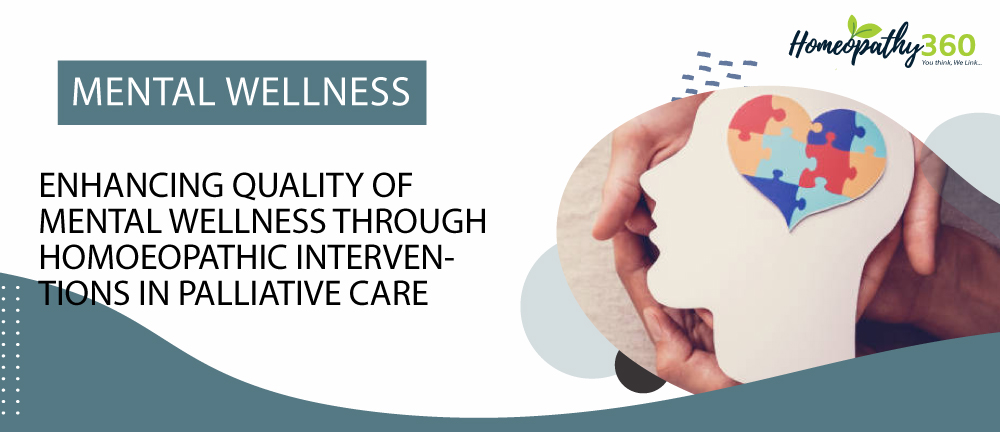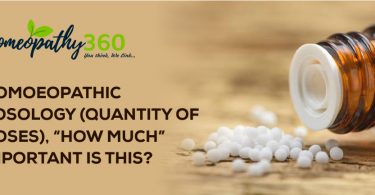
ABSTRACT
Homoeopathy plays a great role in improving the mental health of the patients who require palliative. With its holistic and individualistic approach homoeopathy takes care of various mental issues encountered in patients of palliative care. There are numerous homoeopathic medicines which help in bringing about a mental relief and relaxation for the patients who are undertaking palliative care treatment.
KEYWORDS: palliative care, homoeopathy, mental health, holistic, mental wellness
INTRODUCTION
Palliative care is an approach that improves the quality of life of patients and their families facing the problems associated with life threatening illness, through the prevention and relief of suffering by means of early identification, impeccable assessment and treatment of pain and other problems, physical, psychological and spiritual.1
Palliative care is total care – of patient and his family members.
Palliative care can address a broad range of issues, integrating an individual’s specific needs into care, such as, physical, psychological, social, spiritual and intellectual. It is based upon a holistic approach, working upon the interrelationships of bio-psycho-social-spiritual dimensions of the person. Palliative care is person-oriented whereas curing is disease oriented.
Mental wellness in palliative care
Various psychosocial domains addressed in palliative care are psychological and psychiatric, social, spiritual, religious and existential, cultural, ethical and legal. Amongst these, the psychological aspects seen in patients requiring palliative care are anxiety, fear, depression, anger, hopelessness, ineffective coping, low self-esteem, suicide, stress anticipatory grief, etc. All these can be addressed through palliative care. Experts may provide counseling, recommend support groups, hold family meetings, or make referrals to mental health professionals if and when required.
Apart from these, psychological aspects related to the stress and burnouts of the patient and family are also addressed in palliative care:
Burnout is a state of physical, emotional, and mental exhaustion that may be caused by too much and chronic stress. It makes the caregiver less productive and sucks the energy. Burnout happens when a caregiver feels help is unavailable and tries to do more than the energy and resources to manage. Caregivers who are “burned out” may experience fatigue, stress, anxiety, guilt and depression. They may feel alone, unsupported, or unappreciated. They may become so engrossed in looking after others that they neglect their own emotional, physical, and spiritual health. The demands on the body, mind, and emotions can take over, leading to fatigue and hopelessness. Many caregivers feel guilty if they spend time on themselves rather than on an ill or elderly loved one. This burnout, if remains unattended may take a toll on the caregiver’s overall health. But many a times, the symptoms are not recognized by the caregivers and they end up ruining their own health.
Common signs and symptoms of caregiver stress are: anxiety, depression, irritability, fatigue, loss of energy and lack of interest, insomnia and irregular sleep pattern, body aches and pains, frequent headache, increased or decreased appetite, indulgence in substance abuse(alcohol/drug/smoking), weak immunity system/ frequent infections and flu, impatience, feeling of isolation and hopelessness, overreacting to minor nuisances.
Homoeopathic Approach
Homoeopathy adopts an individualistic and holistic approach towards the sick individual.2 It is based on the philosophy of treating the whole person based on mind, body and life force relationship. It is known that body and mind are dynamically interconnected and both directly influence each other. So, virtually every homeopathic prescription is based on the physical and psychological symptoms of the sick person.3
Psychological symptoms often play a primary role in the selection of the correct medicine.3 Homeopathy gives great importance to mental health both in the treatment of physical and mental illnesses3 seen in the patients requiring palliative care. A single homeopathic medicine administered on the basis of totality of symptoms takes care of the whole! But, along with this patient needs to learn how to handle stress, to bring about cure and to maintain healthy state.
Homoeopathy for mental wellness in palliative care
Homoeopathy is a very good modality for the symptoms commonly encountered in the patients requiring palliative care, such as anxieties due to different causes, fears (also relate to anxiety), anger, behavioral issues, intellectual issues, temperamental issues, intoxications and various mental illnesses (to name a few). Homeopathy not only treats these mental symptoms but also addresses its underlying cause and individual susceptibility.4 The most suitable remedy based upon holistic approach and the principles of totality, individualization, single simple medicine is administered for combating these. Single remedy in potentized form is employed on the basis of the law of similia for the palliation of incurable states also.5 This is the only way through which a state of health can be regained by removing the signs and symptoms from which the patient is suffering.4
Apart from medicines, psychotherapy provided by a homoeopathic physician has a great role for the cure of patients. A good homoeopathic doctor listens, sees, talks, understands his patients. Alongside, a talk with the family members/care-takers of the patient is also needed.
Role of few homoeopathic medicines
- A person’s pain may be reduced greatly by treating their fear, grief or anxiety. Of all the remedies known for helping a dying person, Arsenicum Album is best known for soothing the fear of death, and is indicated when there is agitation, restlessness, thirst, great anguish, internal burning heat with external coldness and desire for warmth.6
- The “death rattle” or Cheyne-Stokes breathing: If the person seems to be having labored breathing, is wheezing or having asthmatic symptoms or burning pains, Arsenicum Album usually helps. Arsenicum Album is also known to help the anxiety around not being able to get a good breath. When secretions build up and create rattling in the chest, Antimonium tartaricum is the main remedy, especially when the person is very weak and becoming unresponsive.6
Our job at this time when a dying person has difficulty breathing is to speak gently and lovingly, and use gentle reassuring touch to ease fear. Do not panic. This can increase any fear that may already be present for the dying person. It is possible and beneficial to enhance the emotional balance of the dying person AND their loved ones as they go through the stresses and stages of grief surrounding death.6
- If acute fear and panic occur, with or without the well known symptom “predicts the time of death”, Aconitum Napellus can be given to relieve his fearful feelings. Aconite is the best remedy when a fearful panic has gripped the body and mind and the heart is racing, and the mind can not relax itself away from the distressing thought pattern. They may have a look of fear in their eyes or be so tense that it is noticeable in their appearance.6
- Taking the cell-salt, Kali Phosphoricum, which is known to be a tonic for the nervous system, may help caregivers who feel tense, stressed and overwhelmed.6
- Insomnia can be helped by Coffea, for alertness when it is time for sleep because they are wired and upset. Arsenicum alb. helps those who cannot sleep due to worry and fear and Ignatia helps a grieving person sleep.6
- We all end up facing the loss of a loved one at some point in our lives. Some losses come suddenly and shockingly; others may be expected, for example at the end of a long illness. But in either instance, the feelings of grief and sorrow can be just as strong. When the grief of the situation starts to overwhelm, homeopathic remedies can bring healing for the dying person as well as their loved ones. Ignatia amara is used during the acute, initial phase of grief immediately before and after death. Ignatia is called the “funeral remedy” and is the number one remedy for acute grief. The sooner it is given, the better—not to suppress the grief but to allow for better coping and avoiding consequences of prolonged grief on the body and mind. The intense grief of Ignatia can bring spasmodic weeping, sadness that is inconsolable and despairing, and contradictory feelings like acute rage. A silent grief, suffered inwardly, needs Ignatia also, and symptoms frequently include a lump in the throat.6
- The effects of cumulative loss are known to be especially trying, when spouse, family and friends are lost and loneliness takes over. Cocculus is known to help those who have been care takers of the sick and now have grief and health problems. Phosphoric Acidum is for grief when there is very low energy and debility of the nervous system.6s
CONCLUSION
Healing does not always mean curing. Sometimes it means helping the patient to prepare for death and to enjoy the last days of his life. Compassionate end-of life- care ensures that they can spend their final days meaningfully and, in an environment, and amongst people they know and love.6 Homoeopathy has an answer to any kind of psychiatric/ psychological ailment. Using homoeopathic remedies for palliative care is safe and free from side effects (even on long term use). Homoeopathy can be adopted as a modality for various issues related to mental health. Afterall, sweet pills make sweet changes!
REFERENCES
- Palliative Care [Internet] 2020 Aug 5 [cited 2022 May 22]. Available from: https://www.who.int/news-room/fact-sheets/detail/palliative–care#:~:text=Palliative%20care%20improves%20the%20quality,of%20caregivers%20improves%20as%20well.
- About homoeopathy [Internet]. [updated 2017 Sep 20; cited 2022 May 17]. Available from: https://www.ccrhindia.nic.in/index1.aspx?lsid=1671&lev=2&lid=610&Regid=0&langid=1
- NHP Admin. Homeopathy and Mental health [Internet]. NHP CC DC; 2015 Sep 28 [updated 2015 Sep 28; cited 2022 May 22]. Available from: https://www.nhp.gov.in/homeopathy-and-mental-health_mtl
- Ruikar P. Homoeopathic treatment for mental health problems [Internet]. [cited 2022 May 22]. Available from: https://www.lybrate.com/topic/treating-mental-problems-with-homeopathy/3c091f2657477520995df9db5bff8747
- Roberts HA. The Principles and art of cure by homoeopathy.New Delhi: IBPP.
- Bello L. End of life care- homoeopathy and hospice patients. Hpathy Medical Publishers [Internet]. 2015 Jan 17. [cited 2022 May 19]. Available from: https://hpathy.com/homeopathy-papers/end-of-life-care-homeopathy-and-hospice-patients/
About the Author:
Dr Manpreet Kaur
BHMS, MD(Hom.), PhD (Hom.), DNHE, Fellowship in Palliative Care
Associate Professor,
Department of Pathology
JR Kisan Homoeopathic Medical College and Hospital,
Homoeopathic Physician and Consultant,
Dr Manpreet’s Homoeo Clinic,
D-49 Sham Nagar, Main Khyala Road (Sheetla Mata Mandir Road)
New Delhi-110018
Member of the Editorial Board of E-journal of NAPCAIM





